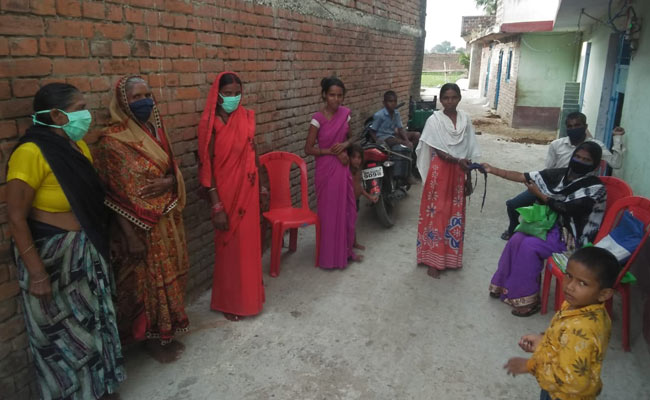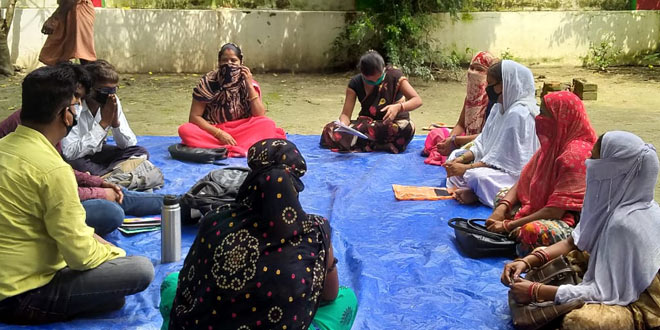Highlights
- 400 Internet Saathis cover 1,200 villages across five districts of Bihar
- Internet Saathis educate the community through tele-counselling
- Internet Saathis get a monthly honorarium of Rs. 1,500
New Delhi: “Initially, people would not pay heed to the information we would provide on maintaining hygiene and safeguarding oneself from the Coronavirus pandemic. They used to say that Coronavirus will not come to our village; the spread of the disease is specific to cities. Later, as the number of COVID-19 cases grew, people started believing us, got serious about fighting the disease and some would even call us and would enquire about COVID precautionary measures”, recalled Pinki Devi, from Nawada block in Kurma village of Bihar. Pinki Devi works as Internet Saathi with UNICEF Bihar and Partnering Hope Into Action (PHIA) Foundation. Ms Devi’s role is to disseminate information regarding the ongoing pandemic and promote COVID appropriate behavior.
Talking to NDTV about the Internet Saathi programme, originally initiated by PHIA Foundation, with support from Google and the Tata Trusts in 2015, Dr Prabhakar Sinha, WASH Specialist, UNICEF, said,
It was started to empower women with digital literacy skills that would enable them to function more effectively as nodal points within their information networks. The initiative established a cadre of digitally savvy women who were able to support their communities with their skills, and came to an end in 2019.
Earlier this year in May, UNICEF along with PHIA Foundation reignited the ‘Internet Saathi’ model in Bihar in an attempt to educate the masses about the COVID-19 pandemic. The team restarted the programme to orient individuals and families through phone calls, video calls and by sending informative messages and videos over WhatsApp on the themes of COVID-19, water, sanitation and hygiene (WASH), and social protection schemes.
Talking about the key role of Internet Saathis in outreach and communication programme, Dr Sinha said,
The programme provides a unique opportunity for decentralised interpersonal communication right at the grassroots. The Internet Saathis maintain close relation with the community, as part of the community, and are able to generate awareness in real time.
Also Read: From WASH To COVID-19 And Menstrual Hygiene, Bhopal’s Alomati Ray Is A True Warrior Of Change
Further explaining the working of Internet Saathis and how they reach out to even those people who don’t have any kind of phone at their home, Dr Sinha said there are three broad categories – households with a smartphone; households having a feature phone; households without a phone. He added,
One smartphone per family is sufficient to connect with the entire family. Information, education and communication (IEC) material that includes videos, and infographics is shared via WhatsApp. Video calls are organised with the family and follow-up phone calls are made to reiterate the messages and discuss and elaborate further in case required. For households with only a feature phone, all the information is relayed to the household orally over phone calls. As part of their training, Internet Saathis are provided with scripts to generate awareness via phone calls when it is not possible to share self-explanatory audio-visual material or infographics and posters.
Also Read: COVID Warriors: Meet Bharti Kumari, A 12-Year-Old Girl Who Makes Masks For Her Community
In June, COVID-19 restrictions had started to ease which made it easier for Internet Saathis to physically meet people who don’t have a phone. They would go door-to-door and communicate often with small groups of neighbours in a village while maintaining appropriate physical distancing and other COVID-19 precautionary measures.
In Bihar, there are currently 400 Internet Saathis covering a total of 1,200 villages across five districts in the state – Gaya, Banka, Nawada, Sheikhpura and Muzaffarpur. According to UNICEF Bihar’s estimates, the initiative has already reached 1.2 lakh people directly and 4.8 lakh people indirectly.
Sharing the outcomes of the initiative, Dr Sinha said,
People expressed their curiosity towards proper sanitation of toilets in case someone gets infected with COVID-19 in a family as most of them have only one toilet in their household premises. The Internet Saathis, thus, have added the disinfection of toilets in such cases to their awareness generation plan. Communities admit to a reduced threat from the coronavirus with increased knowledge on infection prevention and hygiene measures. Handwashing with soap is seen as an integral preventive hygiene practice. Posters and videos on the correct method of handwashing with soap have been widely appreciated by the people as well as the Saathis.
Dr Sinha also informed that during tele-counselling, the focus is not only on COVID-19 but also on WASH practices, waste segregation, educating people about entitlement and social protection schemes which include food and livelihood. As part of the later initiative, Internet Saathi Shanti Devi from Gaya district even got ration cards made for 25 families.
A grievances redressal system was also set-up to support people. Internet Saathis also assist in other COVID-19 response activities such as mask distribution and hygiene promotion activities. Amidst this, Internet Saathis also promoted the concept of waste segregation. During tele-counselling, Chinta Kumari from Gaya district learned that people in her village were not segregating their household waste. Despite explaining the process of segregation and the benefits of it, villagers didn’t follow her advice actively so she resorted to practising and demonstrating. Ms Kumari started composting wet waste which in turn motivated her neighbours to follow the suit and keep the village clean.

Soap and mask distribution by Internet saathi Binda Devi with the village Mukhiya in Sikanderpur village, Bounsi Block, Banka district
The initiative also became a catalyst for Internet Saathis who got a source of income as they were paid a monthly honorarium of Rs. 1,500. Talking about her work, Pinki Devi said,
Where everyone was losing on their job and was facing financial issues, we got a job sitting at home. Through this job, we ourselves learned multiple new things. I feel if people are constantly told about a thing and educated, they tend to listen to you and follow the advice. The fear of contracting Novel Coronavirus led to behavioural change and now people practise handwashing regularly, avoid going to crowd places, wear masks, and even maintain cleanliness at home.

Mask distribution by Internet Saathi Sangeeta, with the support of community mobilisers from Jeevika in Wazirganj block of Gaya district
NDTV – Dettol Banega Swasth India campaign is an extension of the five-year-old Banega Swachh India initiative helmed by Campaign Ambassador Amitabh Bachchan. It aims to spread awareness about critical health issues facing the country. In wake of the current COVID-19 pandemic, the need for WASH (Water, Sanitation and Hygiene) is reaffirmed as handwashing is one of the ways to prevent Coronavirus infection and other diseases. The campaign highlights the importance of nutrition and healthcare for women and children to prevent maternal and child mortality, fight malnutrition, stunting, wasting, anaemia and disease prevention through vaccines. Importance of programmes like Public Distribution System (PDS), Mid-day Meal Scheme, POSHAN Abhiyan and the role of Aganwadis and ASHA workers are also covered. Only a Swachh or clean India where toilets are used and open defecation free (ODF) status achieved as part of the Swachh Bharat Abhiyan launched by Prime Minister Narendra Modi in 2014, can eradicate diseases like diahorrea and become a Swasth or healthy India. The campaign will continue to cover issues like air pollution, waste management, plastic ban, manual scavenging and sanitation workers and menstrual hygiene.
[corona_data_new]


























